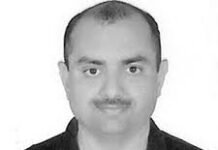I am pleased to bring to you our next guest interview with Chandrima Mitra- Partner, DSK Legal.
Chandrima is a renowned media and entertainment lawyer. She works with some of the biggest names in the M&E sector including superstars like Salman Khan, Aamir Khan and their production houses. She looks after the media and entertainment practice at DSK Legal, Mumbai, one of the esteemed law firms in India.
After graduating from ILS Law College, Pune, Chandrima worked with some of the most prestigious law firms in the country and one of the leading film studios before joining DSK Legal. She has been working on media and entertainment matters for over 12 years now and has been involved in some of the path-breaking litigations in the industry.
1. Chandrima, could you tell us a bit about yourself and your journey as a media and entertainment lawyer?
I graduated from ILS Law College, Pune in 2005 and was recruited from campus by Naik and Naik, which was then Naik, Naik Iyer and Co. Then I was at Nishith Desai Associates for a bit before joining UTV Motion Pictures, the Studio, where I spent 5 years learning the business and magic that we know as Hindi cinema. I then moved back to private practice to join DSK Legal. It’s been an interesting journey and because the industry is a very dynamic one, the learning process is continuous with most days bringing a new challenge.
2. Given that you represent some of the biggest celebrities in the industry including the likes of Salman Khan, Aamir Khan and the talent pool at Matrix India Ent, what are your views on the Consumer Protection Bill, 2018 which imposes liability on celebrities for certain misleading endorsements?
Celebrities have always been a soft target and have time and again been put in a tough spot due to their newsworthiness. By making the celebrities liable for the purported “misleading endorsements” the liability of the owner of the product, manufacturer, the certifying authorities, etc., cannot be diluted.
The celebrities have time and again been exposed to prosecution under provisions of the Indian Penal Code, 1860, Food Safety and Standards Act, 2006 and the Consumer Protection Act, 1986, with regard to the purported “inappropriate advertisements” and endorsement of products, which have allegedly prejudiced the interest of the consumers. In addition to this, now the celebrities will be exposed to litigation with regard to the purported “false/ misleading advertisements” under the proposed Consumer Protection Bill, 2018. This will give rise to the filing of false and bogus claims against the celebrities, with the intent of garnering publicity.
Having said this, certain safeguards to protect the celebrities is provided under the proposed Consumer Protection Bill, 2018, which states that no endorser shall be liable to a penalty if he has exercised due diligence to verify the veracity of the claims made in the advertisement regarding the product or service being endorsed by him. Thus, the celebrities would have to ensure that they undertake a proper due diligence of the products/services being endorsed by them, so as to reduce the risk of being exposed to the penalty as imposed under Clause 21 of the Consumer Protection Bill, 2018. The Advertising Standards Council of India (ASCI) has also released guidelines for celebrity endorsers, which provide that if the Celebrity either directly or through the concerned advertiser/agency chooses to seek advertising advice from ASCI on whether the advertisement potentially violates any provisions of the ASCI Code or not and whether the advertisement is developed fully following the advertising advice provided by the ASCI, then the Celebrity would be considered as having completed due diligence. In view of the proposed penalties on endorsers under the Consumer Protection Bill, 2018 it would be prudent for celebrities to seek ASCI Advisory on their endorsements to safeguard themselves and absolve themselves from liability.
3. There seems to be a growing trend of celebrities especially film stars being accused of hurting religious sentiments (through their performance) and being made an accused party in complaints filed under Section 295A of IPC. According to you what is the solution to tackle this menace?
Actors, directors, writers, producers have time and again been targeted for allegedly hurting the religious sentiments of the public and have found themselves exposed to prosecution under Section 295A of the Indian Penal Code.
Filing criminal cases and FIRs against celebrities has become like a matter of habit for people looking to garner publicity and they are filed all across the country. Like the recent controversy of Padmaavat, where FIR was registered in Jodhpur against the lead actors Deepika Padukone and Ranveer Singh and director Sanjay Leela Bhansali, for hurting the religious sentiments of the people belonging to a certain community.
In view of the provisions of Section 295A of the IPC being grossly misused, the Hon’ble Supreme Court in its judgment dated April 20, 2017 passed in Transfer Petition (Criminal) No. 23 of 2016 (Mahendra Singh Dhoni vs. Yerraguntla Dhyamsundar & Anr.) has held that “it is as clear as crystal that Section 295A does not stipulate everything to be penalized and any and every act would tantamount to insult or attempt to insult the religion or the religious beliefs of class of citizens. It penalizes only those acts of insults to or those varieties of attempts to insult the religion or religious belief of a class of citizens which are perpetrated with the deliberate and malicious intention of outraging the religious feelings of that class of citizens. Insults to religion offered unwittingly or carelessly or without any deliberate or malicious intention to outrage the religious feelings of that class do not come within the section.”
However, the above directions passed by the Hon’ble Supreme Court have not been followed in practice. The recent example of this is the FIR filed against Diljit Dosanjh for allegedly hurting the religious sentiments of Sikhs through the lyrics of his song “Pant mein gun” which is featured in the film ‘Welcome to New York’.
Thus, it is essential that the observations made by the Hon’ble Supreme Court in M.S. Dhoni’s case be followed and accordingly, guidelines/ directives be issued to the police officers as well as the Magistrates with regard to filing FIR under Section 295A of the IPC and/or entertaining complaints under Section 200 CrPC, respectively, which pertain to the allegations against the Actors, Directors, Writers, etc. for hurting the religious sentiments.
4. Be it the AIB Roast, Kiku Sharda’s mimicry act which got him arrested or the recent Padmaavat issue, celebrities seem to have been soft targets and subjected to criminal prosecution. Do you see this as a curtailment of creative freedom of speech and expression?
Though the filing of the criminal prosecution does curtail the creative freedom of speech and expression to some extent, however, the Courts have time and again discouraged entertainment of such sham and frivolous litigations.
The Hon’ble Punjab and Haryana High Court has stayed the proceedings with regard to the FIRs filed against Kiku Sharda by the Haryana Police in Fatehabad and Kaithal districts. Similarly, the Hon’ble Rajasthan High Court has quashed the FIR filed against Sanjay Leela Bhansali, Deepika Padukone and Ranveer Singh with regard to the film “Padmaavat” at Deedwana Police Station, Nagaur District, Rajasthan. In fact, the Hon’ble Rajasthan High Court in its judgment has held that “Once the Censor Board has issued the certificate of exhibition of a movie, manifestly, putting any fetters thereupon by lodging an FIR or otherwise, would amount to clear violation of fundamental right of expression guaranteed under Article 19(1)(a) of the Constitution of India.”
The Hon’ble Supreme Court of India has also upheld the fundamental right of free speech and expression in the order dated January 18, 2018 passed in Writ Petition (Civil) No. 36/2018 (Viacom 18 Media Private Limited & Ors. vs. Union of India & Ors.) where the Hon’ble Supreme Court has held that “It has to be borne in mind, expression of an idea by any one through the medium of cinema which is a public medium has its own status under the Constitution and the statute. There is a Censor Board under the Act which allows grant of certificate for screening of the movies. As we scan the language of the Act and the guidelines framed thereunder it prohibits use and presentation of visuals or words contemptuous of racial, religious or other groups. Be that as it may. As advises at present once the Certificate has been issued, there is prima facie a presumption that the concerned authority has taken into account all the guidelines including public order.”
With regard to the film “PK”, the Hon’ble Supreme Court was pleased to quash the Writ Petition seeking a stay on the exhibition of the film and the Hon’ble Delhi High in W.P (C) No. 112/2015 (Ajay Gautam vs. Union of India & Ors.) has held that “the settled principle in this regard is that the effect of the allegedly offending words/ visuals is to be judged from the standards of reasonable, strong-minded, firm and courageous men, and not those of weak and vacillating minds, nor those who scent danger in every hostile point of view.”
Thus, the Courts have time and again upheld the fundamental rights guaranteed under Article 19 and have curbed the attempts to curtail the creative freedom of speech and expression of the celebrities.
5. Recently there was a coverage on Mr. Sanjay Dutt being aggrieved by his unauthorized biography being published. There have been other instances as well where celebrities have objected to their stories being published without authorization but have seldom been able to do anything about it. Given that biopics and real-life stories have gained traction and commercial value, according to you what recourse can celebrities take to stop such unauthorized publications/ adaptations?
Though personality rights are not recognized as a separate law but personalities are being increasingly recognized as brands. Therefore, today celebrities can take legal action to restrain and restrict the misuse and/or unauthorized use of their name, photographs or attributes and any information that is not publicly available. However, there is no requirement of obtaining any consent for depiction/narration of the events/ information, which is already available in public domain/ records. The Courts have time and again held that the right to privacy no longer subsists in the content/matter, once it becomes a public record.
If any celebrity is prejudiced by the publication of certain events relating to his/her life, the only alternative is to approach the Hon’ble Courts and seek an injunction on publication of the prejudiced material, on the grounds that the publication has infringed the copyright as well as the personality rights of the concerned celebrity and that the celebrity has the sole rights to exploit the same.
To avoid this, the producers/publishers can enter into requisite contracts with celebrities for publication/ depiction of their life story.
6. Any parting thoughts for our readers?
Working in the M&E space and particularly with the celebrities is both challenging and a continuous learning process, because it is not just about the documentation that we work on but also about managing expectations and controlling the narrative since the celebrities live a fishbowl existence.
Chandrima could be reached at Chandrima.Mitra@dsklegal.com
Image source: here












